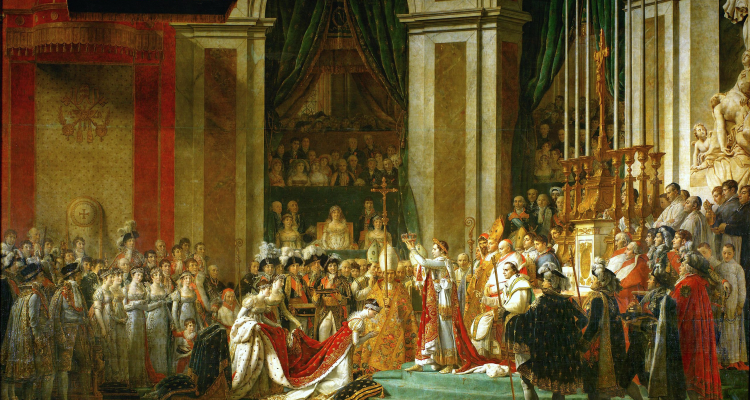When the French Revolution broke out in 1789, Napoleon Bonaparte was serving as a soldier in the Royal Army and rose swiftly through the ranks, until becoming general at the age of 24. In November of 1799, sensing a weakened government, he orchestrated a coup d’état, and became First Consul of France, marking an unofficial end to the ten-year conflict. By 1804, his ambition was not yet satisfied, so he declared himself Emperor of France. To solidify his ascension, he held a coronation which was attended by the leading members of the French aristocracy, government officials and foreign ambassadors and was presided over by Pope Pius VII.
In this painting, “The Coronation of Napoleon,” by, arguably, the most famous of the French neoclassicists, Jacques-Louis David, Napoleon and his wife Joséphine are surrounded by the Paris elite in the Notre-Dame Cathedral. Dressed in regal, bright red clothing, Joséphine kneels before her husband as he prepares to crown himself emperor, defying the tradition that a bishop, or in this case, pope, would crown the king. The whole picture emphasizes richness and royalty. Every one of the nearly 200 guests wears elegant clothing, including the clergy. Gold and dark green are abundantly displayed, and even the intentionally perceptible high ceilings of the church convey the occasion’s grandeur.
The key element of this scene is the elegance and kingliness of the whole endeavor. Though the revolution ended the hereditary monarchy in France (for a time), and principally advocated for a republican government, Napoleon is seen here breaking those very ideals. He is quite literally crowning himself king (under a different word) and reestablishing an authoritarian regime, though one of reform, not stagnation.
As I write this, the United States presidential election has not yet been decided, though I suspect it still won’t have been by the time of this article’s publication. Regardless of who is victorious, there is one critical difference between our election and the rise of Napoleon. We do not have emperors, nor do we have kings. Our president is elected, not an usurper. Our democracy is built on shared ideals of freedom, representation and equality.
While Napoleon made efforts to appear in support of the revolutionary theme “Liberté, égalité, fraternité,” his governance was not as democratic as many would have hoped.
Our democracy is strong and we must have faith that no one person can change that. It depends on all of us to stay calm when tensions are rising, while also being ready to keep our leaders in check if need be. Protecting our democracy is our most important responsibility and doing that will require forethought and restraint. Whether we know who our leader is the night of the election, or whether we must wait a bit longer for that answer, that patience–peaceful patience–is our best response. It should be our only response.


Leave a Reply